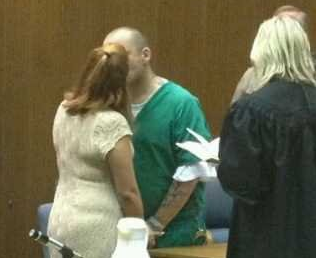There is something special about a courtroom — sacrosanct, almost. In the hushed quiet, there is the inevitable not-too-comfortable spectator seating that discourages people from becoming too relaxed. There is the official bar that separates onlookers from the lawyers — a bar that civilians are not allowed to cross. There are bailiffs to keep the peace. And, of course, there is the elevated bench upon which the honorable judge sits in his or her ceremonial black robes. When it gets down to it, this is their stage, they run the show. Respect for judges is a cornerstone of our judicial system.
Videos By Rare
But what happens when the judge acts erratically or even criminally? Who judges the judge?
In San Diego, Superior Court Judge Patricia Cookson isn’t in any legal trouble — yet — but her behavior has caused quite a stir. After presiding over a murder trial in which Danne Desbrow, 36, was found guilty and sentenced to life in prison, Judge Cookson did something no lawyer there had ever seen. She called up the convicted killer’s longtime girlfriend and married the couple! According to the bride, Destiny Desbrow, they then enjoyed a homemade wedding cake baked by the judge herself — served up on paper plates with plastic forks.
Short of a successful Ethics Committee complaint, Judge Cookson is expected to remain in her $179,000 job until 2018. When she runs for re-election, voters might decide to judge the judge for her baffling act of rewarding a just-convicted murderer with a special ceremony and a cake and vote her off the bench. But experience tells me voters have short memories.
In Montana, District Judge G. Todd Baugh has a better chance of having the electorate boot him to the curb. He’s up for re-election next year. This is the judge who sentenced a former high school teacher — the admitted rapist of a 14-year-old girl — to serve just one month in prison after the accused man violated the terms of his no-jail parole. Stacey Rambold, 54, never had a full-blown trial because his young victim, Cherice Moralez, committed suicide before the case got to court. Compounding the family’s pain was what Judge Baugh said about their dead daughter during his clumsy justification of the short sentence.
“It wasn’t this forcible, beat-up rape,” Baugh explained. And he declared the girl seemed “older than her chronological age” and was “as much in control of the situation” as the much-older teacher. There was an immediate uproar from activists who saw the judge as biased against both females and Hispanics.
Judge Baugh has apologized for his comments — but not for the sentence — and has declined calls for him to resign.
In Las Cruces, New Mexico District Judge Michael Murphy ultimately chose to resign and then got what some believe was a sweetheart plea deal from prosecutors. Murphy was caught on audiotape discussing how judgeships were awarded only to those candidates who first made a sizeable contribution to the sitting Governor’s Democratic Party. Murphy described how he had paid $4,000 to win his appointment to the bench from the Governor in 2006. In addition, Murphy was heard on tape making graphic and disparaging remarks against Mexicans, gays and Jews.
Judge Murphy was about to be judged by the state’s Judicial Standards Commission, but he resigned before any action was taken. For two years he fought felony bribery charges and, in the end, he was allowed to plead guilty to only one misdemeanor. Murphy agreed never to run for public office again and got a year’s probation.
Tell me, please, how judges who dodge justice help maintain confidence in our legal system. Oh, that’s right — they don’t. And those who facilitate such deals are complicit in the erosion of the public’s trust. That’s right, I’m talking to you — prosecutors, defense attorneys and fellow judges who sign off on such plea deals.
There have been times when corrupt judges get the book thrown at them — finally. In Luzerne County, Pennsylvania, two veteran judges were convicted in a years-long “Kids for Cash” scandal. President Judge Mark Ciavarella and Senior Judge Michael Conahan ultimately pleaded guilty to accepting $2.6 million in kickbacks after sending youthful defendants to private juvenile detention facilities in which they had a financial interest. The more inmates shipped there, the more money each judge pocketed. Thousands of juveniles were sent away in the scheme and oftentimes for trivial infractions. A 13-year-old was locked up for throwing a piece of meat at her mother’s boyfriend. A 15-year-old served time for mocking an assistant principal on a MySpace page. An 11-year-old was incarcerated for calling the police after his mother locked him out of the house.
Both former judges have been disbarred and are each currently serving 87 months in prison. But the point is: It took five years for this ugly child-abuse scheme to end. During all that time there were prosecutors, public defenders, social workers and court employees who were eyewitnesses to what was happening.
It is way past time that court systems take a good hard look at policing themselves and their personnel, and that includes the judges in charge of the nation’s courtrooms. Each state’s oversight body for judicial standards needs to step up to the plate — in a timely manner — even if it’s just to remind a judge that baking a cake for a convicted murderer is not entirely ethical. Bar Associations across the country need to tell members that part of their duty as a lawyer includes reporting wrongdoing within the system.
American’s confidence in both the civil and criminal justice systems is under 30 percent according to the latest national polls. Can we afford for it to go lower than that?
[protected-iframe id=”9d322756c29ed0672dc6ac49b950e571-46934866-45124324″ info=”http://c.brightcove.com/services/viewer/federated_f9?isVid=1″ width=”350″ height=”244″]
© CREATORS.COM

